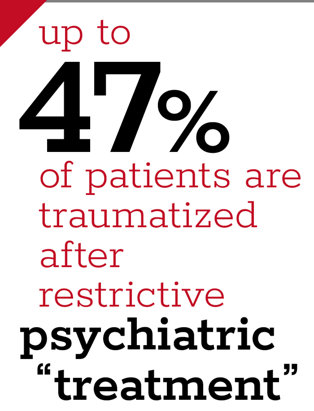Identified in court documents as Jane Doe 1, 2 and 3, the women allege they were assaulted at the Detroit Behavioral Institute (DBI) between 2017 and 2018 when they were teenagers.
The lawsuit, filed against the alleged perpetrator, the facility and its parent company, Acadia Healthcare, raises serious questions about oversight, accountability and the systemic failures that allow abuse to persist in psychiatric institutions. The allegations also demand a reckoning with how vulnerable individuals are protected—or, too often, abandoned—within such spaces.
The abuse is part of a global pattern of human rights violations within “mental health” facilities.
Filed in Wayne County 3rd Circuit Court by Stinar Gould Grieco & Hensley, PLLC, the suit seeks justice not only for the three women at the center of the case, but for a growing number of survivors who say they endured similar trauma at the facility, with more than 40 coming forward to report alleged abuse at DBI over the past two decades.
The lawsuit describes the Jane Does’ case as “uniquely egregious,” and details how one of the nation’s largest psychiatric hospital chains, Acadia, “created, controlled and profited from” a string of wholly owned subsidiaries that “ignored, covered up and otherwise tolerated a culture of child sexual abuse and exploitation” at its facilities, including DBI.

According to the lawsuit, Jane Doe 1 was 15 years old when she was abused and told her mother of her plight in a phone call, prompting the parent to contact Child Protective Services (CPS). But before CPS could interview the young woman, the supervisor who had abused her attempted to intimidate her into silence.
The filing further alleges that Jane Doe 1 requested medical assistance after she was stabbed in the arm with car keys by a staff member in retaliation for reporting the sexual abuse, but was ignored and placed in a restraining room. When she was eventually seen by a nurse, she was advised that her wound required stitches. But instead of receiving proper medical care, she was forced to treat the injury herself. As a result, she developed a keloid scar that has caused her lasting pain into adulthood.
The lawsuit goes on to claim that Jane Doe 2, who was 15 years old at the time of her abuse, was sexually assaulted by the supervisor in 2018. The supervisor raped Jane Doe 3, then 16 years old, in 2017, according to the filing.
Beyond the allegations against the former supervisor, the lawsuit claims that other staff members were complicit in the abuse, choosing to turn a blind eye—or worse, retaliate against the teens who reported the misconduct. Plaintiffs further accuse the supervisor of enlisting other young residents to “bully and attack” fellow patients, including the three women now at the forefront of the case.
More than a local scandal symbolizing broken trust, the abuse is part of a global pattern of human rights violations within “mental health” facilities. The atrocities range from arbitrary detention and lack of access to basic health services to sexual and physical abuse as well as the stripping of personal autonomy.
A 2024 study by the University of Birmingham, for example—the first comprehensive investigation of the negative experiences of psychiatric patients—analyzed 111 previous studies across 25 countries and found widespread trauma and abuse. The research estimates that between 25 percent and 47 percent of patients are permanently traumatized in the wake of restrictive treatments in psychiatric facilities.
Little wonder that organizations like the Office of the UN High Commissioner for Human Rights and the World Health Organization have labeled such abuses “persistent human rights violations” and an “unresolved global crisis.” For Daejia Roberts, one of the women speaking out in the DBI case, the core issue is about more than just her experience—it’s about amplifying the stories of those who remain unheard. “I’m fighting for our justice,” Roberts said during a March 11 news conference, adding: “We will be heard, and it’s not just about us. We are grown adults now. It’s about other kids right now who are abused that don’t have a voice.”
The lawsuit marks the latest legal hurdle for Acadia, which operates over 200 behavioral health facilities nationwide. In September 2024, the company reached a $20 million civil settlement for falsely billing Medicare and Medicaid for patients who did not require “care,” including in Michigan. This followed a New York Times exposé revealing the company had detained psychiatric patients against their will, seemingly in violation of state law.
Less than a year prior, Acadia settled three cases involving allegations of sexual abuse at a New Mexico facility for $400 million. A class-action lawsuit has also been filed against Acadia on behalf of that company’s shareholders.
As more survivors step forward, the case in Detroit brings to light decades of alleged misconduct and institutional failures in psychiatric facilities, serving as a pivotal moment in the fight for accountability and systemic reform.






















